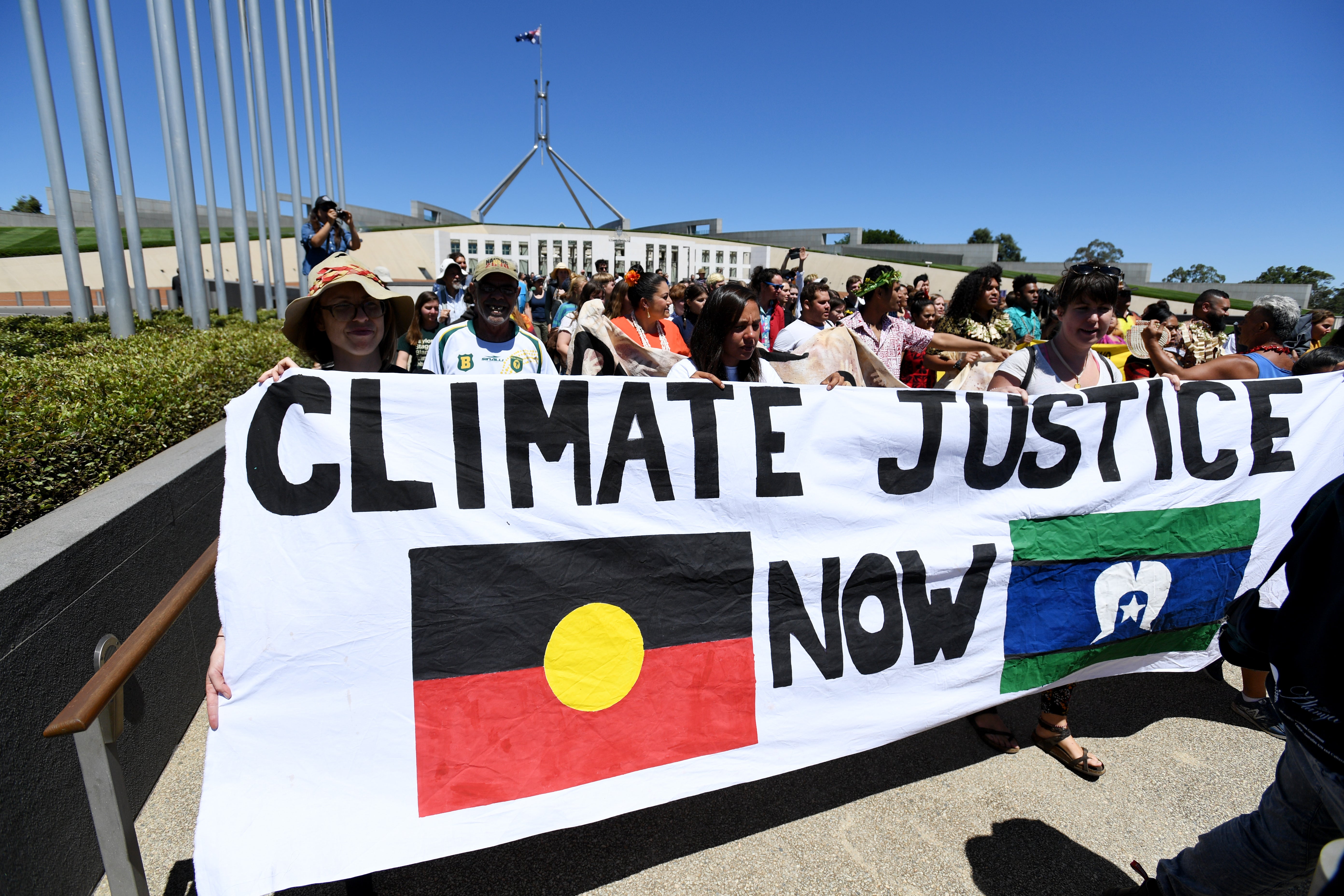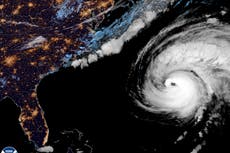Australia told to compensate Torres Strait over failure to act on climate crisis, in landmark UN ruling
Decision labelled ‘a historic victory for climate justice’ sparks hope in low-lying islands

Australia should compensate the islanders of the Torres Strait after violating their human rights by failing to take sufficient action on the climate crisis, the United Nations has said in a landmark ruling.
In what marks the first-ever climate lawsuit brought against a nation state by inhabitants of low-lying islands, the claimants argued that rising sea levels had already damaged food sources and ancestral burial sites, scattering human remains, and had left homes at risk of being submerged.
Three years after the complaint was filed, the UN’s human rights committee ruled on Friday that the Australian government’s failure to adequately protect the Indigenous islanders from climate breakdown represented a violation of their rights to family life and to culture.
The lawsuit – by eight Australian nationals and six of their children inhabiting the islands of Boigu, Poruma, Warraber and Masig – alleged that former premier Scott Morrison’s government had violated their rights by failing to reduce greenhouse gas emissions and upgrade seawall protections, among other failures.
However, the body of 18 legal experts in Geneva ruled that the Canberra government had not committed one of the three alleged violations, that of the right to life, as enshrined in article six of the UN’s International Covenant on Civil and Political Rights, agreed in 1966.
The covenant has been ratified by 173 of the UN’s 193 member states, including Australia. While there is no enforcement mechanism, there are follow-up steps, and states generally comply with the UN committee’s findings.
The ruling represents the first time a nation state has been found responsible for its greenhouse gas emissions under international human rights law, and the first time that Indigenous people’s right to culture has been found to be at risk from climate impacts.
As the first among a wave of similar lawsuits, the UN’s decision could pave the way for similar judgments to be passed on other nations – and embolden other would-be claimants.
Committee member Helene Tigroudja said: “This decision marks a significant development because the committee has created a pathway for individuals to assert claims where national systems have failed to take appropriate measures to protect those most vulnerable to the negative impacts of climate change on the enjoyment of their human rights.”
The UN committee has asked that Australia compensate the islanders for the harm suffered and to take whatever steps necessary to secure the communities’ safe existence.
Australia’s attorney general, Mark Dreyfus, stressed that the case predated the current administration, telling Reuters that Anthony Albanese’s new Labour government was working with the islanders on climate change
“The Australian government engages in good faith with the human rights committee in relation to any complaint received,” Mr Dreyfus said, adding that Canberra was “considering the committee’s views and will provide its response in due course”.
The case was filed in 2019, when the former conservative government led by Mr Morrison, seen as a laggard in the battle against climate breakdown, was in power. Since then, Canberra has passed legislation on emissions cuts.
While Mr Morrison refused an invitation to visit climate-stricken islanders in 2019, Mr Albanese and climate minister Chris Bowen travelled shortly after their election for climate talks on the islands, which are mostly part of Queensland and are situated in the sea passage between Australia and Papua New Guinea.
In their complaint, the islanders alleged that changes in weather patterns had had direct harmful consequences on their livelihood, culture and traditional way of life, with severe flooding caused by tidal surges having destroyed family graves and scattered human remains.
Maintaining ancestral graveyards and communicating with deceased relatives are at the heart of their cultures, they argued and the committee took into account the islanders’ close, spiritual connection with their traditional lands and the dependence of their cultural integrity on the health of their surrounding ecosystems.

The claimants also argued that increased heavy rainfall and storms had degraded their islands’ land and trees, reducing the amount of food available from traditional fishing and farming. On Masig Island, for example, rising sea levels have caused saltwater to seep into the soil and coconut trees to become diseased, killing off the fruit, which are part of the islanders’ traditional diet.
One of the claimaints said that the islanders’ ancestors would be “rejoicing” over the legal victory, which offered a glimpse of hope in the existential battle ahead.
“This morning, when I woke up on Masig, I saw that the sky was full of frigate birds. In my culture, we take this as a sign from my ancestors that we would be hearing good news very soon about this case,” said claimant Yessie Mosby, a Kulkalgal man and traditional owner on the island of Masig.
“I know that our ancestors are rejoicing knowing that Torres Strait islander voices are being heard throughout the world through this landmark case. Climate change affects our way of life every day.
“This win gives us hope that we can protect our island homes, culture and traditions for our kids and future generations to come.”
A lawyer with environmental law charity ClientEarth, Sophie Marjanac, who has been supporting the claimants, called the ruling a “historic victory for climate justice”.
“It is a victory for all peoples who are the most vulnerable to runaway climate change and opens the door to further legal action and compensation claims in international and domestic law,” Ms Marjanac said, urging the Australian government to “act on this decision and take decisive steps to protect the islands”.
“Anything less will be both illegal and a huge moral failing,” she added.
Join our commenting forum
Join thought-provoking conversations, follow other Independent readers and see their replies
Comments

Bookmark popover
Removed from bookmarks